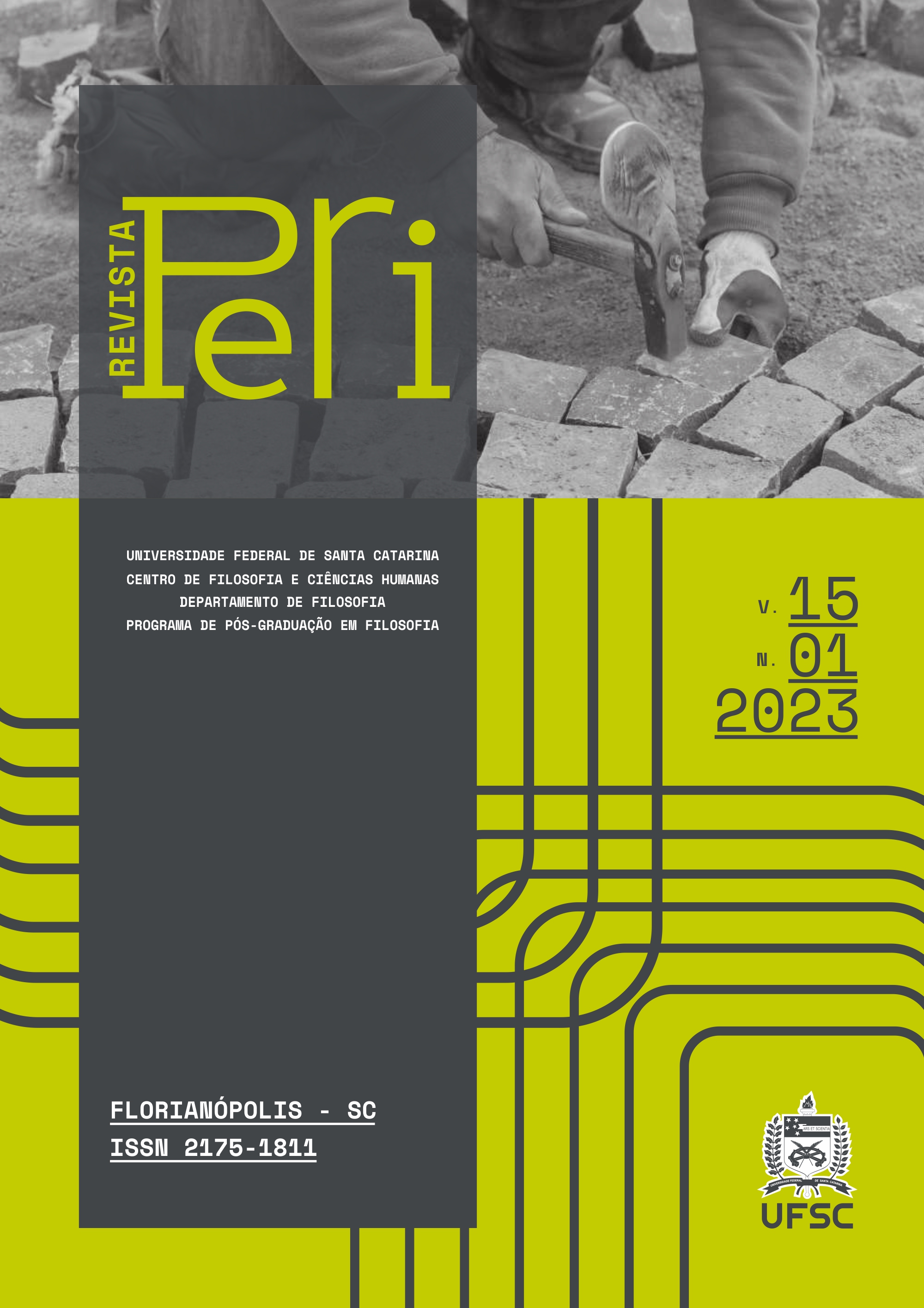Epistemologias da ignorância e ignorância sistematicamente construída
Keywords:
Epistemologies of ignorance, Epistemic injustice, Systematically constructed ignorance, Willfull ignorance, Social epistemologyAbstract
The main goal of this paper is to argue in favor of a different kind of ignorance that can’t be described as a mere absence of an epistemic good like true belief or knowledge. To fulfill this goal, the paper will be sectioned in three parts. The first section will draw attention to the main definitions of ignorance drawn upon the current literature on epistemologies of ignorance, ignorance as absence of true belief and ignorance as absence of knowledge. In the next section, two different kinds of ignorance will be explored, ignorance as a result of epistemic injustice, and white ignorance. In the third section, it will be argued that to take ignorance as a mere absence is not enough to understand the subject, since there are cases of ignorance like shown in section two, that are systematically constructed, thus not accidental.
References
BISPO, Lucas Jairo Cervantes. Sobre a natureza da ignorância. Intuitio, [S.L.], v. 14, n. 2, p. 1-16, 31 dez. 2021. EDIPUCRS. http://dx.doi.org/10.15448/1983-4012.2021.2.40050.
DENICOLA, Daniel. Understanding ignorance: the surprising impact of what we don’t know. Cambridge: The MIT Press, 2017.
FELDMAN, Richard. Epistemology. New Jersey: Prentice Hall, 2002.
FRICKER, Miranda. Epistemic injustice and the preservation of ignorance. In: PEELS, Rik; BLAAUW, Martijn. The epistemic dimensions of ignorance. New York: Cambridge University Press, 2016, p. 160-177.
________________. Epistemic Injustice: Power and the Ethics of Knowing. New York: Oxford Press, 2007.
GETTIER, Edmund. Is justified true belief knowledge? Analysis, 23, p. 121-123, 1963.
GOLDMAN, A; OLSSON, E. Reliabilism and the Value of Knowledge. In: PRITCHARD, Duncan; MILLAR, Alan; HADDOCK, Adrian. Epistemic Value. Oxford: Oxford University Press, 2009, p. 19-40.
GOLDMAN, Alvin; O’CONNOR, Cailin, "Social Epistemology". In: ZALTA, Edward N. (Ed.). The Stanford Encyclopedia of Philosophy, 2021. URL= <https://plato.stanford.edu/archives/win2021/entries/epistemology-social/>.
MAITRA, Ishani. The nature of Epistemic Injustice. Philosophical Books, v. 51. n. 4. 2010.
MEDINA, José. The Epistemology of Resistance: gender and racial oppression, epistemic injustice and resistant imaginations. New York: Oxford University Press, 2013.
_____________ Ignorance and racial sensitivity. In: PEELS, Rik; BLAAUW, Martijn. The epistemic dimensions of ignorance. New York: Cambridge University Press, 2016, p. 178-201.
MILLS, Charles. Global white ignorance. In: GROSS, Mathias; MCGOEY, Linsey. Routledge international handbook of ignorance studies. Oxon; New York: Routledge, 2015., p. 217-227.
_____________. White Ignorance. In: SULLIVAN, S; TUANA, N. Race and Epistemologies of Ignorance. New York: Suny Press, 2007, p. 11-38.
MORVAN, Pierre Le. On Ignorance: a reply to peels. Philosophia, [S.L.], v. 39, n. 2, p. 335-344, 8 dez. 2010.
________________. Knowledge, Ignorance and True Belief. Theoria, [S.L.], v. 77, n. 1, p. 32-41, 17 jan. 2011a.
________________. On Ignorance: a vindication of the standard view. Philosophia, [S.L.], v. 40, n. 2, p. 379-393, 4 out. 2011b.
________________. Why the Standard View of Ignorance Prevails. Philosophia, [S.L.], v. 41, n. 1, p. 239-256, 30 jan. 2013.
________________. When ignorance excuses. Ratio, [S.L.], v. 32, n. 1, p. 22-31, 22 ago. 2018.
ORESKES, Naomi; CONWAY, Erik M.. Merchants of doubt: how a handful of scientists obscured the truth on issues from tobacco smoke to global warming. New York: Blomsbury Press, 2010.
PEELS, Rik. What is Ignorance? Philosophia, v. 38., n.1. p. 57–67, 2010.
__________. Ignorance Is Lack of True Belief: A Rejoinder to Le Morvan. Philosophia, v. 39. no 2. p. 344–355. 2011a.
__________. Tracing Culpable Ignorance. Logos & Episteme, [S.L.], v. 2, n. 4, p. 575-582, 2011b.
__________. The New View on Ignorance Undefeated. Philosophia, v. 40. n.4, p. 741–750, 2012.
__________. What Kind of Ignorance Excuses? Two Neglected Issues. The Philosophical Quarterly, [S.L.], v. 64, n. 256, p. 478-496, 2014.
PEELS, Rik; BLAAUW, Martijn. The epistemic dimensions of ignorance. New York: Cambridge University Press, 2016.
PEELS, Rik; MORVAN, Pierre Le. The Nature of Ignorance: Two Views. In: PEELS, Rik; BLAAUW, Martijn. The epistemic dimensions of ignorance. New York: Cambridge University Press, 2016, p. 12-32.
POHLHAUS, Gaile. Relational Knowing and Epistemic Injustice: toward a theory of willful hermeneutical ignorance. Hypatia, [S.L.], v. 27, n. 4, p. 715-735, 2012. DOI: http://dx.doi.org/10.1111/j.1527-2001.2011.01222.x.
SOMIN, Ilya. Is political ignorance rational? In: HANNON, Michael; RIDDER, Jeroen de (Ed.). The Routledge Handbook of Political Epistemology. Abingdon: Routledge, 2021, p. 241-253.
SULLIVAN, Shanon; TUANA, Nancy. Race and Epistemologies of Ignorance. New York: Suny Press, 2007.
WILLIAMSON, Timothy. Knowledge and its Limits. Oxford: Oxford University Press, 2000.
Downloads
Published
Issue
Section
License
Copyright (c) 2023 João Marcelo Saraiva

This work is licensed under a Creative Commons Attribution-NonCommercial-ShareAlike 4.0 International License.
1. Autores mantém os direitos autorais e concedem à revista o direito de primeira publicação, com o trabalho simultaneamente licenciado sob a Creative Commons Attribution License que permite o compartilhamento do trabalho com reconhecimento da autoria do trabalho e publicação inicial nesta revista.
2. Autores têm autorização para assumir contratos adicionais separadamente, para distribuição não-exclusiva da versão do trabalho publicada nesta revista (ex.: publicar em repositório institucional ou como capítulo de livro), com reconhecimento de autoria e publicação inicial nesta revista.
3. Autores têm permissão e são estimulados a publicar e distribuir seu trabalho online (ex.: em repositórios institucionais ou na sua página pessoal) a qualquer ponto antes ou durante o processo editorial, já que isso pode gerar alterações produtivas, bem como aumentar o impacto e a citação do trabalho publicado (Veja O Efeito do Acesso Livre).






